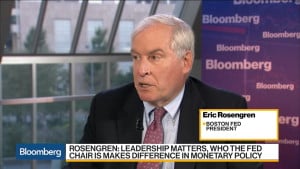While the development and approval of two effective COVID-19 vaccines offer great promise that the public health crisis inflicted by COVID-19 will soon fade, the sputtering rollout of the vaccines is bogging down the economic recovery, the leader of the Federal Reserve Bank of Boston said Tuesday.
Many of the uncertainties that clouded the view when Boston Fed President and CEO Eric Rosengren spoke to the Greater Boston Chamber of Commerce more than eight months ago – Can we develop a vaccine for this virus? How will federal policymakers respond? – “have been resolved in a positive way,” he said in an address to the chamber Tuesday. But an underlying truth remains: a public health recovery is a precondition for an economic recovery.
“So, in the near term, we have to be very concerned about how we solve the public health problem. First of all, by trying to make sure that infections remain as small as possible. And second, trying to get as many people vaccinated as possible in the shortest amount of time,” he said.
Rosengren later added, “Unfortunately the inoculation rate at least to date has been relatively disappointing. Hopefully over the next several months, we’ll see some additional efficiencies in getting the vaccine not only distributed to the states but actually getting it into the arms of people.”
“Until that happens, we’re not going to have a full recovery,” he said.
About 27.7 million doses of COVID-19 vaccine have been distributed nationwide and about 9.33 million people have received at least the first of two doses, according to the U.S. Centers for Disease Control. In Massachusetts, just more than 476,000 doses have been distributed and just more than 204,000 people here have received the first shot, the CDC said.
“I said back in December that I expected that the early part of this rollout would be bumpy, and it’s more than lived up to my expectations with regard to that,” Gov. Charlie Baker said Tuesday. The governor has said the federal government gives just a few days’ notice before shipping more doses, making it difficult for the state to do long-term projections around vaccinations.
Nationally, initial claims for unemployment ticked back up over the last three months and the unemployment rate of 6.7 percent likely understates the true nature of problems in the labor market since it only counts people actively looking for work and not those who have had to leave a job or stop searching for one in order to take care of a family member, Rosengren said.
After a summer that saw many businesses start to work their way back to something closer to normal, the fall and winter surge of COVID-19 in Massachusetts and around the country has hampered those efforts and the broader economic rebound.
“Not surprisingly, when people become concerned about their public health, they become more reluctant to go out and do some of the things that – particularly restaurants, hotels – some of the things that are a little more difficult to socially distance with. And so the labor market has stalled,” Rosengren said Tuesday.
But in the same way that the economy softens as the virus thrives, Rosengren said he thinks the economy is primed for a hearty bounceback once enough people become vaccinated that the virus is no longer as significant of a concern.
“We can all see it, the light at the end of the tunnel when we will all be vaccinated and get back to a more normalized life,” he said, adding that the next two quarters are likely to remain “quite challenging.”
But beyond the next six months, Rosengren said he sees “some strong tailwinds that should provide a much stronger economy,” starting with a personal savings rate that is now “substantially higher” than it was going into the pandemic. Americans are saving, on average, about 12 percent of their disposable income now compared to about 7.5 percent pre-pandemic.
“So there is built up savings for those people that are fortunate, who have continued to have jobs,” he said. “Once the people are able to once again spend more freely, get out of their homes and enjoy some of the things that they’ve missed over the last nine months, we do expect that the savings rate will continue to go down and we will see a more robust pattern of consumption, particularly of some of those services that many people have not been able to take advantage of for the public health concerns.”
People who have significant savings are also benefitting from rising stock prices, Rosengren said, leading him to predict that people who are already wealthy will be more likely to spend money once the economy is more open.
But the pandemic has also further highlighted existing inequities in our society, Rosengren said, and the disparate economic outcomes of the pandemic must be addressed if the economy is going to make as full a recovery as is possible.
“Income inequality is a problem that I think is going to remain a significant challenge and a problem that we really want to address if we’re going to have a more robust recovery going forward,” Rosengren said Tuesday.




 |
| 

